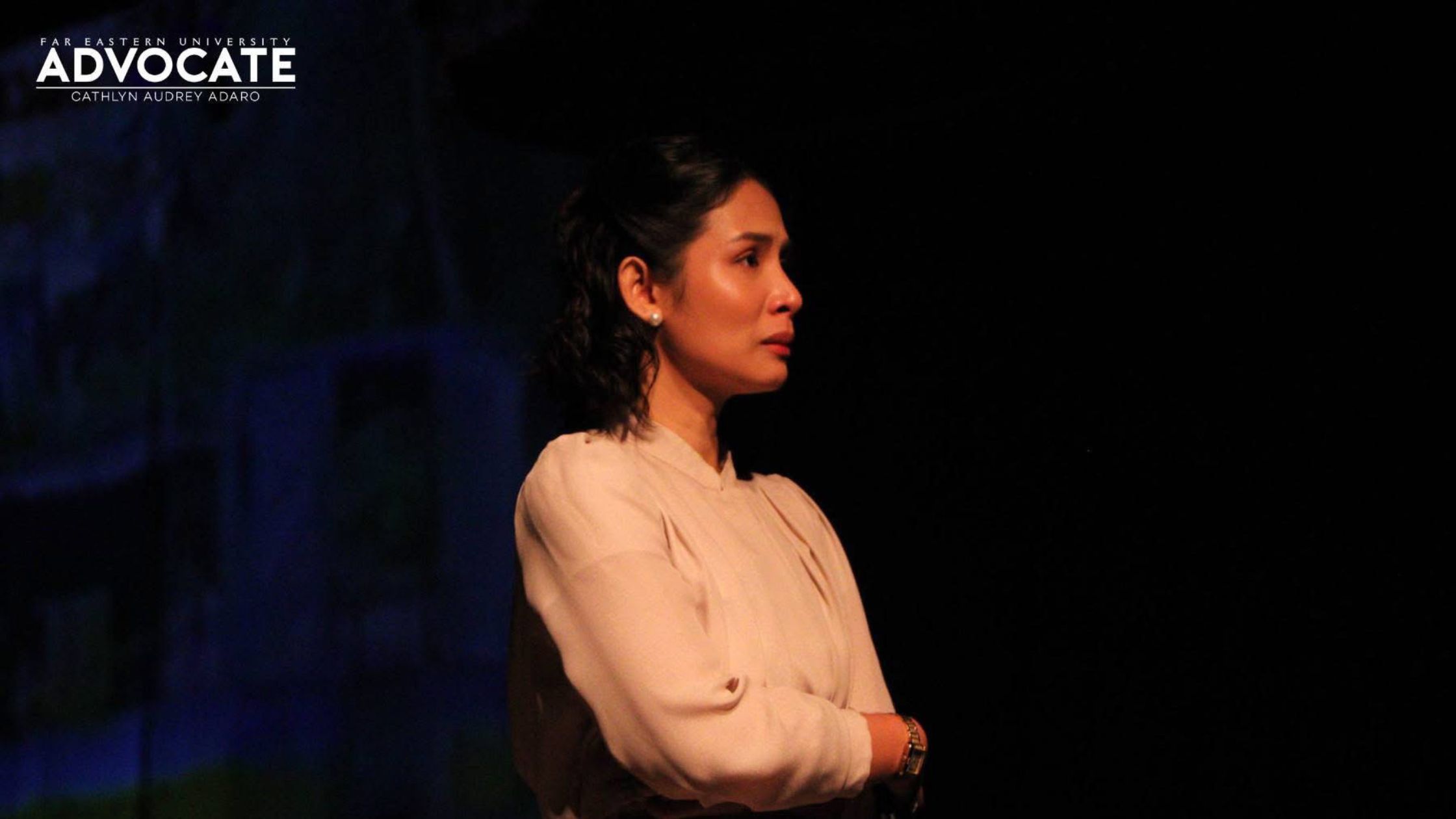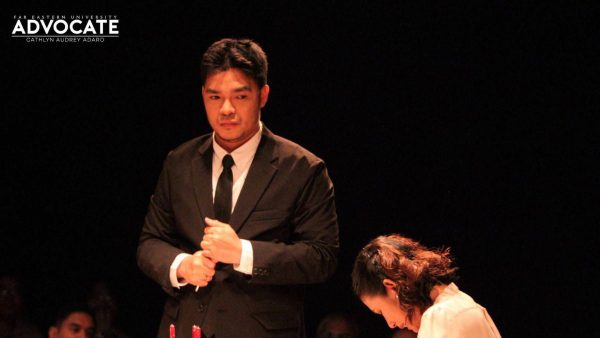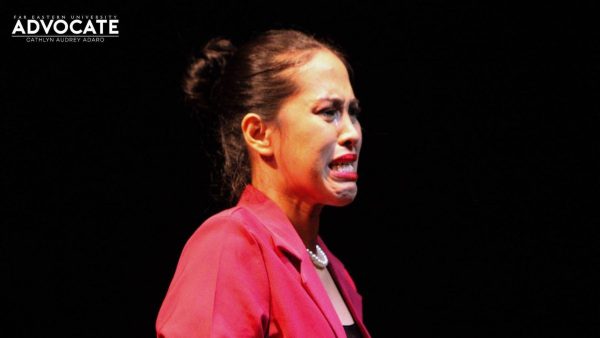
REVIEW: In ‘Sala sa Pito,’ characters seek happiness and love amid painful circumstances
Boxstage Manila’s staging of the Palanca-award winning ‘Sala sa Pito’ explores the sacrifices people are willing or unwilling to make in pursuit of happiness.
Sala sa Pito explores the dilemma of choosing love over convenience and financial stability. Through seven encounters among six characters, the play portrays various struggles, from economic hardships to an abusive marriage to the denial of queer identity.
Although adequately exploring such themes may seem daunting, this production (directed by Dudz Teraña) achieves this through intimate staging and streamlined storytelling. The show transports the audience into various venues in the 1990s, with some tables being set up near the stage so that audience members can feel as if they are eavesdropping on the characters’ conversations. Karaoke staples from the era are performed in the background and in between scenes to give the proceedings a particular ambience.
Strong performances from the cast paint richly layered lives even in the space of a couple of scenes, their joys and heartbreaks evident through each conversation. Ultimately, the show provides some powerful and profound insights into relationships, socio-economic inequality, and different forms of love.
Interlocking stories, intimate encounters
Loosely inspired by Arthur Schnitzler’s La Ronde, George de Jesus III’s Palanca Award-winning play unfolds in seven interlocking scenes between pairs of characters and takes place in a variety of venues – a restaurant, a café, a bar, a lugawan. As the characters’ connections to each other are revealed, it becomes clear that they are all grappling with an important decision about their future happiness.
The production places a sharp focus on the dialogue and not on any elaborate sets or fancy props (production design by Kirstan Orbegoso), with shifts in venue indicated by subtle changes in lighting (lighting design by Arvin Javier and Martin Falqueza). All this allows the strength of the source material to shine through: the dialogue and the observations on human relationships that remain painfully relevant today as they did decades ago.
Characters at a crossroads
As pairs of characters trade places and venues, the constants are the Singer (Jesus Singh III) and the Waiter (Jonas Cunanan) who are usually in the background of every scene, providing commentary and literally “serving” the purpose of their job titles. While Singh III sings beautifully it is unclear what role the singer really needs to have in the story. In earlier scenes, they seem to act like a character’s inner voice or conscience and in another scene, a character interacts directly with the Singer. But in later scenes, the Singer fades into the background completely.

Rowi Du (Mister), Yesh Burce (Misis); Photo Credit: Cathlyn Audrey Adaro/ FEU Advocate
Each character is hoping to break free of certain constraints. Misis (Yesh Burce) is trapped in an abusive marriage with Mister (Rowi Du). Her friend, Yuppie (AJ Sison) is struggling with being gay in a homophobic society. GRO (Tin Calawod) and Masseur (Jel Tarun) are together and just hustling to pay their bills. And Matrona (Kloren Flores) has become bitter and jaded after painful experiences with men.
Burce delivers a moving and heartbreaking performance as a woman whose faith in love is shattered by Du’s charming but brutal manipulator, not a monster but a deeply flawed man.
Calawod is a revelation, easily the most engaging and effortlessly charming character in the story. She and Tarun have an easy, kilig-worthy chemistry and clearly have the healthiest relationship in the show. They are both unwilling to give up their love in exchange for the tempting offers of Yuppie and Matrona of a more comfortable and financially stable life.
Flores has one of the more complex characters. Where Matrona comes across as a stereotypical teleserye villain in her scene with Masseur: domineering, arrogant, condescending, her scene with Mister reveals that this is a defense mechanism developed in response to years of mistreatment.
Love vs. “stability”

Kloren Flores as Matrona; Photo Credit: Cathlyn Audrey Adaro/ FEU Advocate
The characters must eventually choose between love (whether romantic love or self-love) or some semblance of stability that comes with adequate finances and conforming to societal expectations. Some are able to decide more easily than others.
Remarkably, the play does not condemn any of the characters for their choices but treats them all with compassion. It seems to invite the audience not to judge them too harshly but to consider all their complex circumstances.
While most of the stories are effectively and concisely conveyed in the span of two scenes, the seventh and final scene, which shows the origin story of Misis and Mister’s love story and its eventual decline, seems superfluous. This is the weakest entry of the seven, as it does not seem to trust the audience to fill in the gaps about the couple’s backstory. All things considered; this is the main quibble in an overall solid production.
Through its intimate and immersive staging and its engaging performances, Sala sa Pito is a thought-proving exploration of what people are willing to endure, ignore or embrace in the name of love and happiness.
Tickets: Php 800, Php 1,000
Show Dates: November 14- 15, 22,29, December 5-6, 2025
Venue: FEU Center for the Arts
Running Time: approx. 1 hour 30 minutes
Company: Boxstage Manila
Creatives: Dudz Teraña (director), George de Jesus III (playwright), Jojo Malasig (assistant director), Kirstan Orbegoso (production design), Arvin Javier and Martin Falqueza (lighting design)
Cast: Yesh Burce (Misis); Rowi Du and Kobie Hachero (Mister); Jasper Estaras and AJ Sison (Yuppie); Karyl Oliva and Tin Calawod (GRO); Jel Tarun and Sean Asuncion (Masseur); Kloren Flores (Matrona); Jonas Cunanan and Renz Dotillos (Waiter); Brigitta Claire and Jesus Singh III (Singer)


Comments